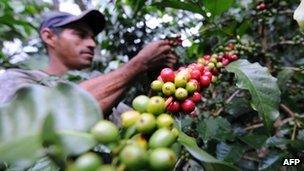Colombia and Farc rebels reach agreement on land reform
- Published

The government of Colombia and left-wing Farc rebels have agreed on land reform, after more than six months of peace talks.
"This agreement will be the start of a radical transformation of rural Colombia," read a joint statement.
The deal calls for the economic and social development of rural areas and providing land to poor farmers.
Land reform is one of the most contentious issues in the talks on ending five decades of conflict.
"Today we have a real opportunity to attain peace through dialogue,'' said the Colombian government's chief negotiator, Humberto de la Calle.
"To support this process is to believe in Colombia," he told journalists at the talks in the Cuban capital, Havana.
Long way to peace
The Farc, Colombia's largest guerrilla group, has been in talks with the government on the Caribbean island since last November.
Farc chief negotiator Ivan Marquez said several issues remained unresolved and would be dealt with in later discussions.
"We have advanced in the construction of an accord that will necessarily be checked over before the completion of the final agreement."
The talks in Cuba are the fourth attempt to reach a negotiated settlement of the conflict, the longest-running in Latin America.
Sunday's agreement calls for fair access to land, and rural development - two key causes of the armed conflict.
It also calls for the creation of a land bank, as a way to reallocate land, including areas seized illegally during the fighting.
Analysts and aid groups say much of it was taken by far-right paramilitary groups on behalf of cattle ranchers and drug traffickers.
The government, however, blames at least a third of the seizures on the Farc - a claim the rebels deny.
'Encouraging development'
The agreement marks a significant step forward in the peace process, says the BBC's Sarah Rainsford in Cuba.
Peace talks will resume on 11 June on the second major issue - the rebels' participation in politics.
After Sunday's agreement was announced, Colombian President Juan Manuel Santos said on Twitter: "We celebrate, really, this fundamental step in Havana... to end half a century of conflict.
"We will continue the (peace) process with care and responsibility."
Mr Santos previously said he wanted the talks to end this year.
But both parties have stressed that nothing is finalised until a complete peace accord is reached.
The Farc originally set out to overthrow the government and install a Marxist regime, but in recent years the rebels have become increasingly involved in the drug trade to finance their campaign.
According to the United Nations, Colombia is the top producer of coca leaf, the raw material for making cocaine.
Much of the illicit drug goes to the United States, and the Andean country has been for more than a decade a major recipient of US counter-narcotics aid through the so-called Plan Colombia.
On Monday, US Vice President Joe Biden is expected to meet Mr Santos as part of an official visit to Bogota that is centred on drugs, security and trade.
"It is an encouraging development that these negotiations will lead to the end of the conflict in Colombia," said US Ambassador to Colombia, Michael McKinley, ahead of Mr Biden's visit.
It is difficult to find reliable statistics on how many people died from the violence in Colombia.
Hundreds of thousands of people have been killed since the conflict began in the 1960s, with some three million more internally displaced by the fighting.
The Farc is thought to have some 8,000 fighters, down from about 16,000 in 2001.
- Published22 May 2013
- Published9 April 2013